The Debunking Handbook: now freely available for download
Posted on 27 November 2011 by John Cook
Update Oct. 14, 2020:
The Debunking Handbook is now available in an extensively updated version written by Stephan Lewandowsky, John Cook, Ulrich Ecker and 19 co-authors. Read about this new edition in this blog post: The Debunking Handbook 2020: Downloads and Translations
The Debunking Handbook, a guide to debunking misinformation, is now freely available to download. Although there is a great deal of psychological research on misinformation, there's no summary of the literature that offers practical guidelines on the most effective ways of reducing the influence of myths. The Debunking Handbook boils the research down into a short, simple summary, intended as a guide for communicators in all areas (not just climate) who encounter misinformation.
The Handbook explores the surprising fact that debunking myths can sometimes reinforce the myth in peoples' minds. Communicators need to be aware of the various backfire effects and how to avoid them, such as:
It also looks at a key element to successful debunking: providing an alternative explanation. The Handbook is designed to be useful to all communicators who have to deal with misinformation (eg - not just climate myths).
The Authors:
John Cook is the Climate Change Communication Fellow for the Global Change Institute at the University of Queensland. He created and runs Skeptical Science and co-authored the book Climate Change Denial: Heads in the Sand with environmental scientist Haydn Washington. In 2011, Skeptical Science won the Australian Museum Eureka Prize for the Advancement of Climate Change Knowledge.
Professor Lewandowsky is an Australian Professorial Fellow and a cognitive scientist at the University of Western Australia. He received a Discovery Outstanding Researcher Award from the Australian Research Council in 2011. His research examines people's memory, decision making, and knowledge structures, with a particular emphasis on how people update information in memory. He has published over 120 scholarly articles, chapters, and books, including numerous papers on how people respond to misinformation. (See www.cogsciwa.com for a complete list of scientific publications.) Professor Lewandowsky is an award-winning teacher and was Associate Editor of the Journal of Experimental Psychology: Learning, Memory, and Cognition from 2006-2008. His research has been funded continuously since 1990 by public agencies in 5 countries, but he has no commercial interests of any kind. He has also contributed numerous opinion pieces to the global media on issues related to climate change "skepticism" and the coverage of science in the media. A complete list of his public essays can be found at http://www.shapingtomorrowsworld.org/inthemedia.htm, which is a blog run by academics from W.A.'s three major universities.
Translations
Since first being published in 2011, The Debunking Handbook has been translated into the following languages:
Dutch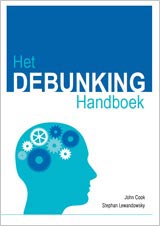 |
French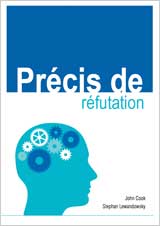 |
|||
German |
Hungarian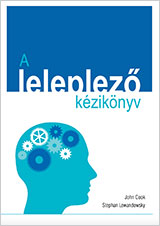 |
Icelandic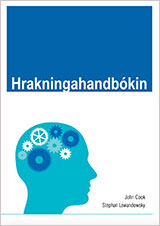 |
||
Indonesian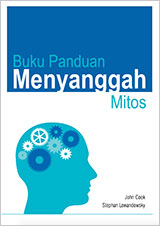 |
Italian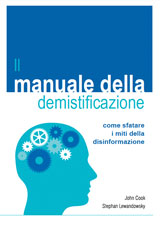 |
Polish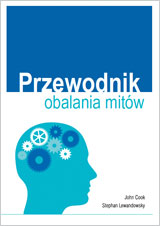 |
||
Portuguese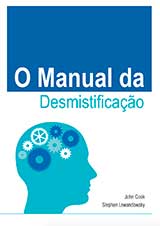 |
Spanish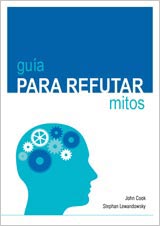 |
Swedish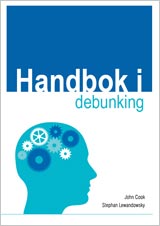 |
||
Turkish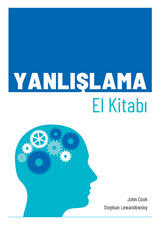 |
Update: Open Access Slideshow
In collaboration with Ullrich Ecker from the University of Western Australia, we have put together the “Myth Debunking Slideshow” (Ecker, Cook & Lewandowsky, 2012) - an open-access slideshow summarizing both the basic research on misinformation and recommendations on how to deal with misinformation in practice. The presentation is designed in popular Microsoft PowerPoint software, and is licensed under Creative Commons, meaning it is free to use, adapt and distribute under most conditions.
Update June 2017: Some news about The Familiarity Backfire Effect
Here is an excerpt from Stephan Lewandowsky's blog post Claiming that Listerine alleviates cold symptoms is false: To repeat or not to repeat the myth during debunking?
"[...]Recent research, however, has not found a familiarity backfire effect under conditions where it was expected. In a nutshell, two articles published by colleagues and I (with Ullrich Ecker and Briony Swire, respectively, as lead authors) found evidence for familiarity-based processing but failed to find a familiarity backfire effect.
You can read more about this latest research in a series of three blog posts on Shaping Tomorrow's World:
- Can Repeating False Information Help People Remember True Information? - published on June 19, 2017 by Tania Lombrozo
- Qualifying the Familiarity Backfire Effect - published on June 20, 2017 by Briony Swire
- Familiarity-based processing in the continued influence of misinformation - published on June 21, 2017 by Stephan Lewandowsk
Although our experiments showed that familiarity-based processing does not lead to a backfire effect in some cases (even when it is expected to occur), our studies remain moot on whether familiarity backfire effects will occur in other circumstances.[...]"
This post has been cross-posted at Shaping Tomorrow's World.































 Arguments
Arguments





















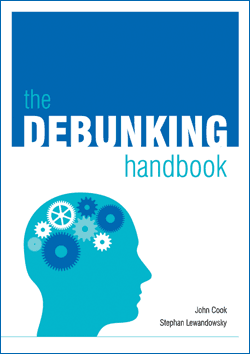
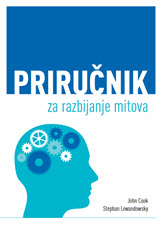









The example used in this book is terrible!
If you want to convince the world about climate change being caused by humans you don't make the argument based on that 97 out of a 100 climate scientist agree with that statement!
The general public does not trust climate scientists and with good reason because advocating disaster can have great career prospects.
You have to use real arguments.
[PS] Please read the comments policy on this site. If you make sweeping statements like above, then please provide support for your argument. Further wild rhetoric like this will be deleted.
graafderaaf not that old canard again. Nobody is using the existence of a consensus as a scientific argument for the existence of anthropogenic climate change. If you look around the myths discussed here, you will find that we base our arguments on peer-reviewed scientific articles. If you disagree with any of them, then I would encourage you to post a comment on a relevant topic explaining your scientific objections.
The existence of a consensus ought to be a good way of communicating expert opinion on more or less any scientific topic, as it shows you what the mainstream scientific position actually is. Ignoring the opinion of qualified people is hubris and folly of the highest order.
As to career prospects, I think you ought to do some research to find out how much academics get paid, it isn't actually all that much when you think how long they spent earning the qualifications and compared to how much management in industry earns for similar levels of responsibility, or qualifications (e.g. actuarial salaries).
It is ironic that you complain about faulty reasoning and then procede to use an ad-hominem! ;o)
Graafderaaf, a common pseudo-dkeptic argument is that there is disagreement among scientists on the subject. Closer examination reveals that there is no significant disagreement, in fact less so than many other scientific subjects.
Can you explain how exactly advocating disaster helps with carreer propects? I recall Sallie Baliunas predicting "trillions" of dollars of losses and economic mayhem as a result of the CFC ban to protect the ozone layer, how has that helped her carreer?
"The general public does not trust climate scientists and with good reason because advocating disaster can have great career prospects."
As a working scientist, this is simply a crazy notion. If anything, scientists tend to be conservative to avoid seeming "unobjective" to their peers. And it is to their peers that they must answer.
Actually, graafderaaf, you've apparently failed to read the Handbook. It is not based on the 97% consensus. The 97% graph is used to illustrate one method (of many noted) of working with the general public.
Great resource! It's a pity that it's only available in PDF format, an .epub or .mobi version would be greatly appreciated!
I'd read The Debunking Handbook once before and it was worth re-reading recently, although it can't cover everything to do with climate communication. Really we all want civil, informative, constructive dialogue but things can get out of hand. If there's a personal attack on Twitter it's hard not to respond with an excessive salvo and risk provoking a 'backfire effect'. I want to explain science, I want what I say to be well-supported (so I usually double-check via diverse comprehensible web sources beforehand), but when it comes to climate I also want to link to people's values and encourage action. It's hard to know for sure that, while confident you're putting reasonable effort into representing science correctly, you're not adding even more noise and confusion that is a barrier to public consensus.
Restating the central point and trying to reduce distraction is fairly easy to remember. However, it's not always easy to remember to provide an 'alternative explanation' that sticks and doesn't reinforce the myth, as it can be on a very obscure point.
In extreme cases responding does involve questioning motives of sources which is a kind of ad hom. In many online discussions (and the rarer face-to-face ones), there are people who are 'cautious' and confused by what appear to be advanced arguments, and it's necessary to simplify things. I feel a simple analogy like 'greenhouse gases are like an extra blanket' can summarise in a supportable way. In some ways, the handbook seems at odds with Diethelm & McKee 'Denialism: what is it and how should scientists respond?' (2009), which says 'a willingness to look at the evidence as a whole, to reject deliberate distortions and to accept principles of logic. A meaningful discourse is impossible when one party rejects these rules'. I still think it's worth attempting. Quite popular at the moment is a list of cognitive biases to look out for in self and others https://www.yourbias.is. Daniel Dennett also recommends:
Finding something you have in common will encourage mutual trust and enable the subject matter to be looked at more seriously and critically. As I understand it, this is the idea of Kahan's 'two-channel communication'. It's also something addressed for different audiences by Climate Outreach, a UK-based charity providing research and training: two key things I take from them are a) need to reach across political divides and include all; b) need to couple the science and risks of climate change with a positive message appropriate to the audience.
Recommended supplemental reading:
In his own words: Behind a one-time skeptic's climate 'flip' by Bud Ward, Yale Climate Connections, Nov 20, 2017
A chat leads to a change of view on climate by Karin Kirk, Yale Climate Connections, Nov 21, 2017
Any chance these could also be released in an e-book format like mobi or epub? The PDF is hard to read on an e-reader.
I cant speak for Sks on this, but in my experience, graphics and figures dont do well on ereaders and Sks handbook makes heavy use of them.
Barış C. Kaştaş created a Turkish translation of The Debunking Handbook which has been added to the list of available translations.
Update Oct. 14, 2020:
The Debunking Handbook is now available in an extensively updated version written by Stephan Lewandowsky, John Cook, Ulrich Ecker and 19 co-authors. Read about this new edition in this blog post: The Debunking Handbook 2020: Downloads and Translations